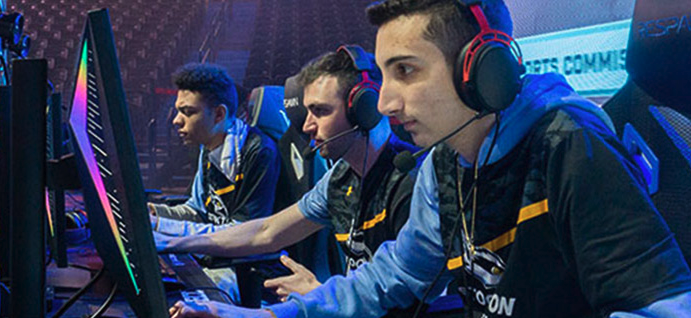By Loukaia Taylor, ’22
https://stockton.edu/diversity-inclusion/esports-equalizer-of-gen-z.html
It seems that esports is on everyone’s radar or at the tip of their tongue no matter where you look.
From professional tournaments that can earn players millions of dollars to casual “Smash” nights with friends, esports and video games are enjoying a time of unprecedented attention and expansion.
In what information security officer Demetrios Roubos described as a “grassroots effort,” the Stockton Esports Collegiate Organization was created in 2018 following a meeting with 10 interested students.
The 10 soon grew to 50 when he hosted an interest meeting, and, soon after, Building 80 on campus became the collegiate organization’s headquarters for competitive video game playing. The organization currently has more than 300 members, according to Leonardo Acefe, a senior Computer Science major from Northfield and gamemaster for the “Overwatch” team.
Both Roubos and Acefe agree accessibility and the appeal of various games to diverse audiences drove the organization’s growth.
“Getting a $100 tablet is less expensive than, say, hockey equipment is, so I think that the bar is lower in terms of accessibility within the world of esports,” Roubos said. “But then, in particular, the collegiate scene, we have facilities on campus that are generally accessible to the students. In other words, you don’t need to be a member of the esports team to go out to the esports facility. From an accessibility standpoint, universities and colleges with existing facilities are a major equalizer in terms of how accessible these games are.”
“In terms of our teams, I’ve worked with a lot of different people, including people who don’t even have their own computers at home,” Acefe said. “We give them a shot by inviting them to our esports facility. I think that opens up a lot of opportunities, too, because who doesn’t love gaming?”
How Does Stockton Esports Stack Up?
In the world of esports, the game “Rocket League” is extremely popular among other titles. The premise of the game is, essentially, playing soccer with cars, which takes a lot of technique to master, according to Acefe.
“It sounds very straightforward, but it’s actually really mechanically hard to master,” Acefe said. “Our ‘Rocket League’ team is currently No. 2 in the country, which is insane. Those people are really talented, and it’s really impressive to see because I don’t know how to do it.”
Not only are they No. 2 in the world – their streams are also very popular, sometimes with more than 1 million viewers. (Viewership numbers provided by Brian Busse, senior and captain of the “Rocket League” team.)
Preparing Students for the Future
The first thing that comes to mind when one mentions esports is an image of a player, typically in a larger-than-usual swivel chair with their head in between multiple screens and their hands furiously wearing out their “W,” “A,” “S,” and “D” keys. While somewhat accurate, that’s not the only way to get involved in the esports industry.
In fact, that’s what Noel Criscione-Naylor, chair of the Hospitality, Tourism and Event Management program at Stockton and member of the Esports Trade Association, is trying to show students through the various esports courses on offered at Stockton. Stockton recently announced a partnership with Middle Township School District to offer dual-credit courses, and Stockton is developing an esports degree program within the School of Business.
Her argument is that esports can be a vehicle for students that can lead to careers in science, technology, engineering and math (STEM), something that many communities are trying to achieve for their youth.
“Those fields have traditionally lacked racial diversity, so we’re starting to see a lot of the marginalized communities around us, not only in New Jersey but around the whole state, have schools and community organizations that are investing in equipment to create these inclusive environments for children,” Criscione-Naylor said. “So, if they don’t potentially have $100 tablets at home, they can still compete somewhere else in the community.”
She also said esports has an inherent entertainment aspect and sets of universal skills, such as managing and planning competitions, building collaborations between organizations, etc., which gives the industry the longevity it needs to sustain more careers for students after they graduate.
“I can’t tell you what it’s going to look like in 10 years, but I can tell you the ecosystem that follows it is currently something that aligns and marries very well with what is existing in hospitality and tourism,” Criscione-Naylor said. “People are always going to want some form of entertainment and events. The ecosystem surrounding esports and the skills and jobs that will be necessary to support and incubate it as an industry is never going away, whether esports continues to evolve or not. Though, I see it evolving.”
Centering Accessibility for an Already Diverse Industry
Andrew Weilgus, the director of the Esports Innovation Center (EIC) on Stockton’s Atlantic City campus, believes t\esports is an industry that is “the most diverse demographic that you can find.”
But rather than considering the whole industry a sport, Weilgus suggests separating the various titles of the games played as different sports, like football and baseball, within the structure of esports.
Viewing the industry in this way allows us to see that various titles are more popular with certain demographics than others. For example, “League of Legends” and “Starcraft” are popular among Asian players, while “Smash Bros.” and other competition titles have a more mixed audience among minority communities, according to Weilgus.
“There’s never going to be the same audience for each of those games,” Weilgus said. “Within that community, you could have games that are extremely segmented. For example, (the professional football game) ‘Madden’ has an incredible following amongst former athletes and even people who are my age and still play it.”
Acefe agreed with Weilgus’ assertion, saying that culture is also a driver of esports’ popularity. Acefe said countries like the United States and South Korea are almost overrepresented in the esports scene compared to other places.
“South Korea has a very, very huge gaming culture,” Acefe said. “It’s kind of interesting to see. It would be nice to see more players from South America, Europe, the Middle East, Africa and more. All of those places are, like, untapped right now when it comes to esports, and I think a lot of people are trying to bring more of that environment to them.”
Even though audiences may grow and change with more titles and games being created, Weilgus said the industry will stay on the upward slope. He thinks in 10 years, we’ll all be laughing at the idea of esports being strictly online or played on consoles like PlayStation and Xbox, especially with the ever-growing popularity of avenues like virtual and augmented reality.
Despite all of this positive growth within the industry, there are still financial and socio-economic barriers that some players face. For example, Atlantic City’s Youth Services office wanted to provide a program for children to participate in esports competitions and tournaments. However, this venture at another esports facility would have been expensive for both the city and the children in the program.
That’s where Weilgus stepped in.
“I told her, ‘Let me speak with my tech partners and we’ll get this place outfitted for you all to base your program here and we’ll run it out of the EIC, with no cost involved in doing that,’” Weilgus said.
Weilgus has many objectives for the center, including a nonprofit set up in partnership with the New Jersey Economic Development Authority and Stockton to promote esports in South Jersey and Atlantic City.
A priority is making sure the diverse players of these games in esports have access to valuable opportunities within the technology industry.
“One of the missions for the EIC is as we attract companies into this new territory and try to incentivize them to build jobs, that we are consciously trying to build those jobs to a diverse audience and to not have them exclusively available for privileged kids from different programs,” Weilgus said.
Looking Ahead at the Esports Industry
Criscione-Naylor, Roubos, Weilgus and Acefe all see the unique position that esports occupies right now. As a new and upcoming industry in the “golden age of accessibility,” people in the industry have an opportunity to have diversity, equity, inclusion and belonging be a driving factor toward its success now instead of later.
“The work that we all are doing and contributing to right now and because we’re aware of concerns in how other areas have developed, diversity, inclusion and access are all on the forefront of everyone’s mind. In the past, it’s been an afterthought, but we’re going into this with those principles right up front,” Criscione-Naylor said. “This is different than we’ve ever experienced before; we’re creating equity from the ground up.”
“Ten to 15 years out from now, as technology evolves and we get more into the realm of AR/VR, my fear is that it will become less accessible to disabled individuals,” Roubos said. “I don’t think it will affect Stockton, really, but within the industry as a whole, it may affect a group of marginalized individuals and we should be aware of that.”
“I agree with Demetrios in that we’re going to run into a lot of things that we weren’t necessarily thinking about early on, but I think and hope that the benefits will far outweigh the negatives and that we have some mechanism to deal with them,” Weilgus said. “I think knowing that ahead of time and encouraging ways to combat that is important. Groups like Garden State Esports and others will have a duty in promoting the things that will stay balanced and that are more inclusive.”
“I think definitely the next step is more diversity and bringing it to every corner of the globe,” Acefe shared. “I want a world where there are tournaments in every country, and I could go on a world tour and play a different video game tournament in each country. I also want people to think of it more seriously; like, I want a kid to go up to their parents and say, ‘I want to do esports one day,’ and they say, ‘That’s a great field to join,’ because it is. There’s a lot of opportunity and it’s still growing.”

